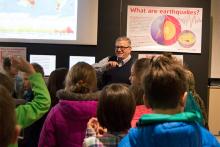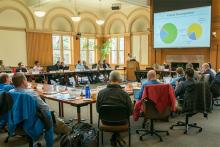The three-day Shake, Rattle & Rocks program gave fifth-graders from the region the chance to experience what it means to be an earth scientist.
Penn State researchers have received a $20 million, five-year project with the U.S. Department of Energy (DOE) looks to create a state-of-the-art framework of computational tools that will help to assess the impacts of weather-related variability and change.
Annie Tamalavage and Marla Korpar, both 2013 EMS graduates, were among a handful of judges who returned to Penn State’s University Park campus to serve as judges for the College of Earth and Mineral Sciences’ (EMS) Undergraduate Poster Exhibition.
Delicate fossil remains of tomatillos found in Patagonia, Argentina, show that this branch of the economically important family that also includes potatoes, peppers, tobacco, petunias and tomatoes existed 52 million years ago, long before the dates previously ascribed to these species, according to an international team of scientists.
The Department of Geosciences offers M.S. and Ph.D. degree programs that provide students with a broad background in any of the major areas of geological sciences and intensive research experiences culminating in the preparation of a formal thesis. The goal of the programs is to prepare students for scientific careers in academia, government, or industry. A wide range of faculty interests and exceptional laboratory and other support facilities provide an extensive variety of areas of specialization in which students may choose their course work and research topics, which include: aqueous geochemistry, chemistry and physics of rocks and mineral, geodynamics, global change and earth history, sedimentary geology and paleobiology, solid earth and applied geophysics, surficial processes.
M.S. or Ph.D. degrees available
The M.S. degree typically requires two years of study to complete and the Ph.D. (without an M.S.) about four years. Students entering with a B.S. or B.A. degrees may choose, with faculty approval, to bypass the M.S. degree and work directly for the Ph.D. Currently about a third of our students are in the M.S. program and two thirds are in the Ph.D program.
Careers
The goal of our programs is to prepare students for specific careers in academia, government, or industry. Students are encouraged to publish in the peer-reviewed literature as part of their dissertation research.
Where Our Graduates Find Jobs
- Universities
- Government agencies
- Industry
Obtaining a minor in geophysics can help you learn how to apply physics, quantitative, and technical skills from your major to the geophysical aspects of Earth science. Whether you're interested in seismology, volcanology, natural hazards, environmental geophysics, or petroleum and mineral exploration, the minor can help you build a broader skillset.
For students majoring in Geosciences, the completion of the minor will strengthen their physics/quantitative background and develop links between theory and application for these technical and quantitative skills.
The minor will prepare students for graduate programs in geophysics, and/or employment opportunities in the environmental and exploration industries.
If you want to create solutions to the problems arising from the interaction between man's technological and social activities with the natural environment, then the Earth Sciences major is right for you. The degree offers flexibility and breadth across the geosciences, geography, and meteorology. This major provides a comprehensive program in environmental sciences based on a strong emphasis in earth sciences. It is especially directed toward study of the problems that arise from the complex interaction of man's technological and social activities with the natural environment.
Graduates are in demand for positions in government, industry, and consulting. Professional activities include gathering and evaluating data on environments; management and coordination of specialized programs in environmental control and modification; and industrial and government planning. Suitable choices of courses may qualify students for graduate work in several fields.
Careers
Graduates are in demand for positions dealing with environmental science, teaching, or environmental law or policy within government, industry, and consulting. These roles focus on gathering and evaluating data on environments, managing and coordinating specialized programs in environmental control and modification, and industrial and government planning.
Where Earth Sciences Graduates Find Jobs
- Teachers in schools
- Consulting firms
- Government agencies
Student Clubs and Organizations
The Geosciences minor provides a foundation in the physical and material aspects of the solid Earth, as well as an introduction to field techniques and technical writing. The flexible minor allows you to select from a choice of advanced courses and tailor your interests.
Some areas that graduates with the Geosciences minor may work in include Earth materials, evolution of the Earth and life, hydrogeology, environmental geology, natural hazards, plate tectonics, geophysics, and climate change.
The outdoors is your lab in geosciences. The geosciences are concerned with understanding earth processes and the evolutionary history of the Earth. Through either the B.A. or B.S. in geosciences, you can prepare yourself to address environmental problems; discover and develop resources such as groundwater, metals, and energy sources; solve technology-generated environmental problems such as acid mine drainage and waste disposal; predict geological events, such as the occurrence of earthquakes and volcanism; and solve questions about the origin and evolution of Earth and life.
Careers
The B.A. program is designed to prepare you for careers that deal with science, social science, and business, such as environmental law, national and international planning or resource management, and K-12 teaching.
The B.S. program helps prepare you for careers in the petroleum and mining industries; local or federal resource management; water resources, treatment and management; energy and environmental industries; and academia.
Two DEGREE PROGRAMS
BACHELOR OF ARTS (B.A.)
With a Bachelor of Arts program stresses data collection; investigation, analysis and synthesis of information related to complex natural problems; rigor of thought and clarity of oral and written expression. The B.A. provides a basic education in geosciences, and is designed for students who wish to prepare themselves for careers that interface among science, social science, and business.
BACHELOR OF SCIENCE (B.S.)
The Bachelor of Science program provides a broad foundation in the physical and natural sciences for students who seek immediate employment or post-graduate education in several areas of the geosciences. The B.S. program offers two options:
- General Option
- Hydrogeology Option
Where Our Graduates Find Jobs
- Oil & Gas
- Engineering Services
- Colleges, Universities, and Professional Schools
- Government
- Management, Scientific, and Technical Consulting Services
Student Clubs and Organizations
INTEGRATED B.S. AND M.S. PROGRAM (EARN BOTH IN 5 YEARS)
Integrated B.S./M.S. Degree Program: The integrated undergraduate-graduate (IUG) program enables academically superior and research-focused undergraduate students to also obtain an M.S. degree in Geosciences in five years of study. Students who wish to complete the Integrated B.S./M.S. Program in Geosciences must apply for admission to the Graduate School and the Integrated B.S/M.S. program by the end of their junior year.
Focus your studies on the history of life and its interactions with the Earth through the bachelor of science in geobiology program. The program brings together courses in geosciences and biology and related fields and embraces the history of life and its interactions with the Earth over geologic time. It also includes study of interactions between living organisms and physical and chemical processes in the modern environment on Earth, and possibly elsewhere in the universe. Geobiology is critical to the study of environmental quality, global change and environmental-human health interactions, all of which have profound importance in legal, economic, and policy arenas.
Careers
This degree is ideal for students who wish to pursue careers in environmental geology, geochemistry, environmental microbiology, museum paleontology, and even medicine. Students will be well prepared for advanced studies in this emerging discipline, and for careers in the environmental sciences.
Where Our Graduates Find Jobs
- Universities
- Research labs
- Museums





